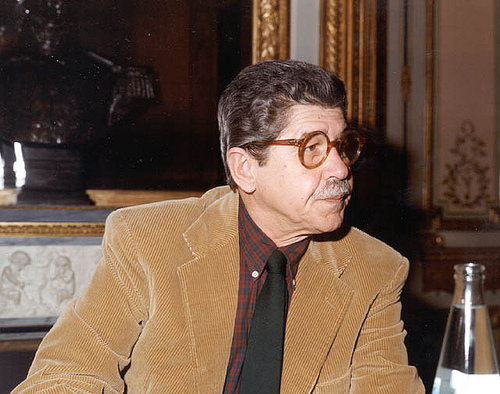The 2012 Prize for Discord
by Horacio Castellanos Moya and translated by Sam Cogdell / November 22, 2012 / No comments
A Peruvian writer convicted of plagiarism wins Latin America’s most prestigious award.
The Guadalajara International Book Fair’s selection of Peruvian writer Alfredo Bryce Echenique as the winner of the 2012 FIL Literature Award for Romance Languages has created a scandal. Several Mexican writers have protested the fact that the prize, which carries a cash award of $150,000, and up until now has been the most prestigious in Latin America, was awarded to a writer accused and convicted of plagiarism in his home country.

- Corkscrew is focused on Latin American issues. Literature, journalism and politics are the main concerns of this column. A corkscrew is useful only if it opens a bottle, hopefully full of something that would enlighten our spirits, but we could also set loose a cruel Genie or a rotten wine. The author will follow this principle: look for topics that open debates, new perspectives, and controversy. Cheers!

- Horacio Castellanos Moya is a writer and a journalist from El Salvador. For two decades he worked as a journalist in Mexico, Guatemala, and his own country. He has published ten novels, five short story collections and two books of essays. He was granted residencies in a program supported by the Frankfurt International Book Fair (2004-2006) and at City of Asylum/Pittsburgh (2006-2008). In 2009, he was a guest researcher at the University of Tokyo. Currently he teaches at the University of Iowa.
The case was further tinged with embarrassment when the directors of the fair decided to award the prize to Bryce privately at his home in Lima, rather than at the Guadalajara International Book Fair’s inaugural gala event, as has been the tradition. The book fair’s directors recognized that, given the polemics and protests, conditions were not conducive to awarding the prize in public. Doing so might have created an even bigger scandal.
Bryce Echenique (born in Lima in 1939) has had a long career as a writer. His novel A World for Julius (1970) was a literary event in the Spanish-speaking world. Since then he has published several books, possibly of lesser quality, but certainly of great impact nonetheless. He lived in France for many years, and also in Spain, where he won important prizes. Upon his return to Lima, he became a newspaper columnist. It was soon discovered, however, that many of his columns were plagiarized from the work of little-known Spanish writers. Bryce defended himself by saying that the inappropriate use of other writers’ columns had been an error on the part of his secretary. He was tried in Peru, found guilty, and fined.
Now the directors of the FIL prize have washed their hands of the situation. They claim the jury selected the winner and have simply accepted the decision, with no power to change it. The jury, for its part, has said that it decided to award the $150,000 prize to Bryce because of the high quality of his fiction, not for his newspaper columns.
Bryce’s response has been very clear: He didn’t ask for the prize, it was awarded to him. There was no reason for him to turn down the $150,000 that was presented to him at his home. His response to those who’ve questioned him about it has been: “They can fuck off.” He would probably have the same thing to say about those whose columns he plagiarized.
Nevertheless, the question that’s still up in the air is whether the jury (which was headed by the writer Jorge Volpi, and included academic Julio Ortega, and reporter Leila Guerrero, among other well-known figures), foresaw that awarding the prize to Bryce would set off protests, considering that the plagiarism scandal has been public knowledge for several years. Or is it that the jury’s decision was not concerned with ethical considerations such as plagiarism and was instead motivated by the publishing industry’s commercial interests?
For now, the only thing that’s certain is that the prestige of the FIL Prize has taken a hit. Clearing the air of the doubts surrounding it will be an arduous task for its directors.





